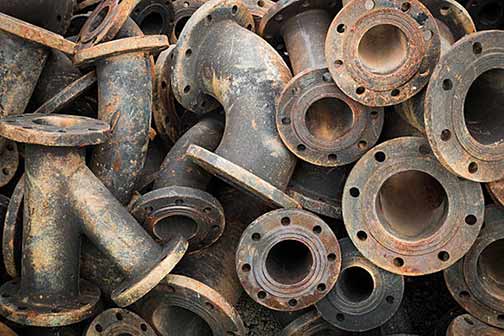Understanding Cast Iron Pipe Issues
Cast iron pipes have been a staple in plumbing systems for decades due to their durability and longevity. However, over time, these pipes can develop significant issues that can affect water flow and lead to severe damage. Common problems associated with cast iron pipes include corrosion, cracks, and leaks. Corrosion occurs as the iron reacts with water and other elements, leading to rust and weakening of the pipe structure. Cracks can develop due to shifting ground or external pressure, while leaks can result from both corrosion and cracks, causing water damage to your home.
It’s crucial to understand these issues because they not only affect the integrity of your plumbing system but can also lead to costly repairs. Identifying the signs early on, such as discolored water, slow drainage, or visible rust, can help in addressing the problems before they escalate. Regular inspections and maintenance are essential to prolong the life of your cast iron pipes and ensure your home’s plumbing system operates efficiently.
Homeowners Insurance Coverage Basics
Homeowners insurance provides financial protection against various risks, including damage to your property and personal belongings. A standard homeowners insurance policy typically covers structural damage, personal property loss, liability protection, and additional living expenses if you need to temporarily relocate due to covered damages.
However, the specifics of what is covered can vary significantly between policies and insurance providers. It is important to thoroughly understand your policy’s terms and conditions to know what types of damage are covered and under what circumstances you can file a claim. Key factors that determine coverage include the cause of the damage, the extent of the damage, and the specific components of your home that are affected.
Specific Policies and Coverage for Pipes
When it comes to cast iron pipes, coverage under homeowners insurance can be complex. Most standard policies do not automatically cover wear and tear or gradual deterioration. However, if the pipe damage results from a specific covered peril, such as a sudden and accidental event like a fire, burst plumbing pipe due to freezing, or accidental discharge of water from a plumbing system, you may be eligible for coverage.
It’s essential to review your specific policy details to determine if pipe-related damages are included. Some insurance companies offer add-ons or endorsements that provide additional coverage for plumbing issues, including cast iron pipes. These endorsements can help cover the cost of repairs or replacement in case of damage due to unforeseen events. Speaking with your insurance agent can provide clarity on what your policy covers and help you decide if additional coverage is necessary.
Considerations for Chicago Residents
Chicago residents need to be particularly mindful of the unique challenges faced by homeowners in this region. The city’s weather, including harsh winters with freezing temperatures, can significantly impact the condition of cast iron pipes. The freeze-thaw cycle can cause pipes to expand and contract, leading to cracks and eventual failure. Additionally, the age and construction style of many homes in Chicago, often built with cast iron plumbing, make understanding insurance coverage for these pipes even more critical.
Given Chicago’s climate and the potential for severe weather, it’s prudent for homeowners to proactively inspect and maintain their plumbing systems. Ensuring proper insulation of pipes, especially in unheated areas like basements and crawl spaces, can help prevent freezing. Moreover, understanding local building codes and any specific regulations related to plumbing can help homeowners make informed decisions about repairs and insurance needs.

In the unfortunate event of cast iron pipe damage, it’s essential to act swiftly and follow a structured process for dealing with the damage and filing an insurance claim.
Dealing with Pipe Damage and Insurance Claims
In the unfortunate event of cast iron pipe damage, it’s essential to act swiftly and follow a structured process for dealing with the damage and filing an insurance claim. Start by documenting the damage with photographs and detailed notes. This evidence will be crucial when communicating with your insurance company.
Next, contact your insurance provider to report the damage and begin the claims process. An adjuster will likely be assigned to assess the damage and determine the extent of coverage. Be prepared to provide any maintenance records and inspection reports that demonstrate the condition of your plumbing system before the incident.
Working with a licensed plumber to get an estimate for repairs or replacement can also be beneficial. The plumber’s expert opinion can support your claim and provide a clearer picture of the necessary work. Throughout the process, maintain open communication with your insurance provider to ensure all required documentation is submitted and any questions are promptly addressed.
Preventive Measures and Maintenance Tips
Preventing damage to cast iron pipes involves regular maintenance and proactive measures. Here are some tips to help maintain the integrity of your plumbing system:
- Schedule regular plumbing inspections to identify and address potential issues early.
- Use drain cleaning products and services sparingly to avoid damaging the pipes.
- Insulate pipes in unheated areas to prevent freezing during winter.
- Replace aging or damaged pipes promptly to avoid extensive repairs and water damage.
- Consider using water softeners to reduce the effects of hard water on your plumbing system.
Implementing these preventive measures can help extend the life of your cast iron pipes and reduce the likelihood of significant damage. Regular maintenance not only protects your home but also ensures that your plumbing system remains efficient and reliable.
Recommendations for Chicago Homeowners
For Chicago homeowners, understanding the nuances of homeowners insurance coverage for cast iron pipes is crucial. Here are some practical recommendations to help navigate this complex topic:
- Review your current homeowners insurance policy to understand what is covered and identify any gaps.
- Consider purchasing additional endorsements or riders that cover plumbing-related damages, including cast iron pipes.
- Maintain a detailed record of inspections and repairs to support any future insurance claims.
- Speak with a licensed Chicago plumber to assess the condition of your cast iron pipes and get professional advice on maintenance and potential upgrades.
- Prepare for Chicago’s harsh winters by insulating pipes and taking other preventive measures to avoid freezing and bursting.
By taking these steps, Chicago homeowners can better protect their properties from potential plumbing issues and ensure they have the necessary coverage in place. Being proactive and informed helps in managing risks effectively and provides peace of mind knowing that you are prepared for any plumbing-related challenges that may arise.
